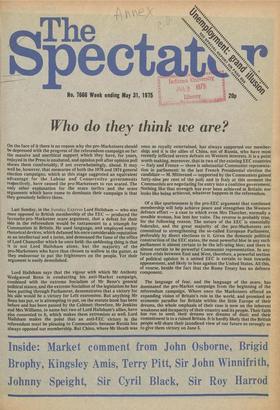Who do they think we are?
On the face of it there is no reason why the pro-Marketeers should be depressed with the progress of the referendum campaign so far: the massive and uncritical support which they have, for years, enjoyed in the Press is unabated, and opinion poll after opinion poll shows them comfortably, if not overwhelmingly, ahead. It may well be, however, that memories of both the 1970 and 1974 general election campaigns, which at this stage suggested an equivalent advantage for the Labour and Conservative governments respectively, have caused the pro-Marketeers to run scared. The Only other explanation for the scare tactics and the scare arguments which have come to dominate their campaign is that they genuinely believe them.
Last Sunday, in the Sunday Express Lord Hailsham — who was once opposed to British membership of the EEC — produced the favourite proMarketeer scare argument, that a defeat for their side in the referendum would be tantamount to a triumph for Communism in Britain. He used language, and employed empty rhetorical devices, which defamed his once considerable reputation as an intellectual and a jurist, and demeaned the fame of the office of Lord Chancellor which he once held: the saddening thing is that it is not Lord Hailsham alone, but the majority of the pro-Marketeers who have thus chosen to wallow in the gutter, as they endeavour to put the frighteners on the people. Yet their argument is easily demolished.
Lord Hailsham says that the vigour with which Mr Anthony Wedgwood Benn is conducting his anti-Market campaign, combined with the extreme Socialism of Mr Benn's general political stance, and the extreme Socialism of the legislation he has been putting through Parliament, demonstrates that a victory for his side would be a victory for Left extremism. But anything Mr Berm has put, or is attempting to put, on the statute book has been before and has been passed by the Cabinet: therefore, Mr Jenkins and Mrs Williams, to name but two of Lord Hailsham's allies, have also consented to it, which makes them extremists as well. Lord Hailsham makes the point that an anti-EEC victory in the referendum must be pleasing to Communists, because Russia has always opposed our membership. But China, where Mr Heath was once so royally entertained, has always supported our membership; and it is the allies of China, not of Russia, who have most recently inflicted severe defeats on Western interests. It is a point worth making, moreover, that in two of the existing EEC countries — Italy and France — there is substantial Communist representation in parliament: in the last French Presidential election the candidate — M. Mitterand — supported by the Communists gained forty-nine per cent of the poll; and in Italy at this moment the Communists are negotiating for entry into a coalition government. Nothing like that strength has ever been achieved in Britain; nor looks like being achieved, whatever happens in the referendum.
Of a like spuriousness is the pro-EEC argument that continued membership will help achieve peace and strengthen the Western defence effort — a case to which even Mrs Thatcher, normally a sensible woman, has lent her voice. The reverse is probably true, for the following reason. The nature of the EEC is essentially federalist, and the great majority of the pro-Marketeers are committed to strengthening the so-called European Parliament, preferably by direct elections to it. Given the domestic political construction of the EEC states, the most powerful bloc in any such parliament is almost certain to be the left-wing bloc; and there is almost certain to be powerful Communist representation. In any future crisis between East and West, therefore, a powerful section of political opinion in a united EEC is certain to lean towards appeasement, and likely to lean against the United States. All this, of course, beside the fact that the Rome Treaty has no defence component.
The language of fear, and the language of the scare, has dominated the pro-Market campaign from the beginning of the referendum campaign. Where once the Marketeers offered an expanding vision of Britain's role in the world, and promised an economic paradise for Britain within the little Europe of their dreams, the whole emphasis of their case is now on the inherent weakness and incapacity of their country and its people. Their faith has run to seed; their dreams are dreams of dust; and their commitment is to a ruined Britain. It is hardly likely that the British people will share their jaundiced view of our future so strongly as to give them victory on June 5.


























